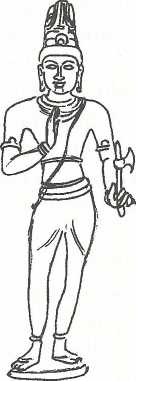Talk:Caṇḍeśvara
By Swami Harshananda
Caṇḍeśvara as a deity of Śiva[edit]
Caṇḍeśvara is one of the attendant deities of Śiva. According to the mythological lore he was a brāhmaṇa boy. His other name was Vicāraśarman. He rose to that status by his intense devotion to Śiva.
Iconographically, he is shown as a fierce deity holding weapons of war like:
- Bow
- Arrow
- Trident
- Chisel
- Noose
- etc.
He is also known as Caṇḍi and Caṇḍeśa. Though independent shrines dedicated to him are common, he is generally installed in every Śiva temple in the north eastern corner, facing south. Devotees believe that he can act as a mediator interceding with the Lord on their behalf. Hence supplication before him is a duty of every devotee visiting a Śiva temple.
Caṇḍeśvara as a Minister of the King Harisirihadeva[edit]
There is one other Caṇḍeśvara (14th cent. A.D.) of Mithilā. He was a very important compiler of digests on dharmaśāstras. He was a minister as well as the chief justice at the court of the king Harisirihadeva of Tirhut (now in Bihar). He belonged to the Karṇāta family. Smṛtiratnākara or Ratnākara is the extensive digest compiled by him. This digest is divided into seven sections. He had also written two other literary works. All his works are mentioned below:
- Kṛtyaratnākara - what ought to be done
- Dānaratnākara - gifts
- Vyavahāraratnākara - judicial procedure
- Śuddhiratnākara - purificatory rites
- Pujāratnākara - ritualistic worship
- Vivādaratnākara - disputes (civil and criminal laws)
- Gṛhastharatnākara - duties of householders
- Krtyacintāmani
- Rājanitiratnākara
Later writers on dharmaśāstras from Mithilā and Vaṅga (Bengal) have been greatly influenced by him.
References[edit]
- The Concise Encyclopedia of Hinduism, Swami Harshananda, Ram Krishna Math, Bangalore

